Huawei’s Meng Wanzhou retreats from public eye in Vancouver
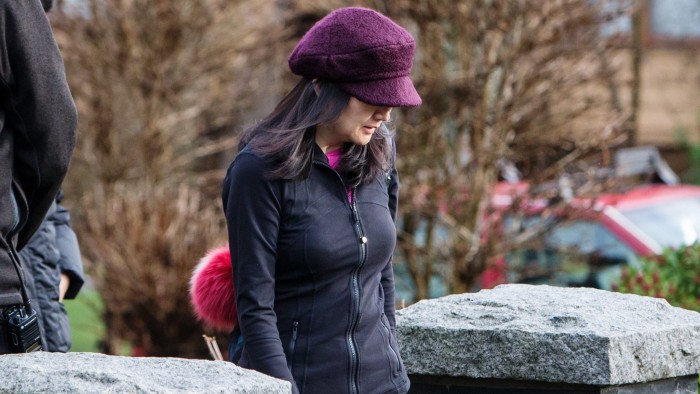
Roula Khalaf, Editor of the FT, selects her favourite stories in this weekly newsletter.
For the past two months, people have gathered on a street in Vancouver’s pricey Dunbar neighbourhood, snapping photographs of a $4m mansion with its blinds drawn.
Onlookers are not interested in the exterior of the house — but they are concerned about the fate of its resident, Huawei’s finance chief Meng Wanzhou, who is currently under house arrest awaiting an extradition hearing on US fraud charges.
They cannot get too close to the property: several silver-haired security guards from Canada’s Lions Gate Security firm stand in front of the drive at all times, clutching walkie-talkies. Charged with ensuring she does not flee the country, some are also stationed nearby in parked SUVs with blacked-out windows.
The treatment of Ms Meng, the daughter of the billionaire founder of the Chinese telecoms group, has sparked a diplomatic storm, as Washington and Beijing thrash out the terms of a potential trade agreement and US lawmakers dial up their rhetoric against Huawei over cyber espionage and intellectual property theft concerns.
China has accused the US of politicising her case, while seemingly retaliating by arresting two Canadians on national security charges. But the decision has also rocked Vancouver’s thriving Chinese community, who view the 47-year-old as an unsuspecting scapegoat.
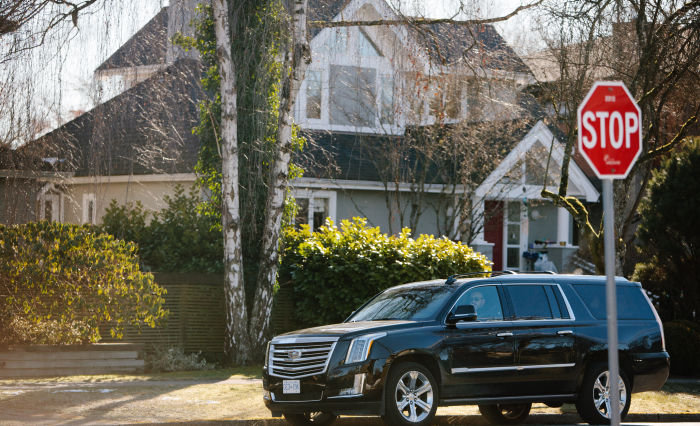
“Every Chinese person based here thinks it’s the wrong decision,” said Grace, a Vancouver resident in her forties who relocated from China two years ago, as she took photos on her phone of Ms Meng’s mansion to send back to worried friends in her home country. “We know her father, he’s a very popular figure in China.”
Ms Meng was first detained on December 1 while changing flights in Vancouver, as part of a multiyear investigation by the US justice department into whether Huawei breached sanctions against Iran.
Within 10 days, she had secured a $7.5m bail, with some of her friends in Vancouver — where her family owns the $4m property, as well as a $12m house nearby, and often spent holidays — offering up collateral.
If extradited, she will face multiple fraud charges for allegedly lying to US banks to circumvent Iran sanctions, with each carrying a penalty of up to 30 years in prison.
Canada’s justice ministry on Friday issued an “authority to proceed” with the extradition request, giving the go-ahead for the case to formally be heard at British Columbia’s Supreme Court. Ms Meng is also scheduled to appear in court next week to set further hearing dates.
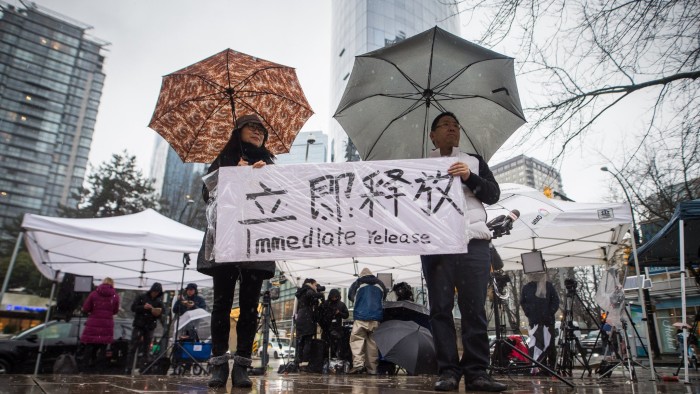
The Dunbar property has served as a regular holiday haven for Ms Meng — whose father Ren Zhengfei has an estimated $3.2bn fortune — since the family bought it in 2009. But her links with the community stretch back further: she had Canadian permanent residency until 2009 and several of her children went to school in Vancouver.
One neighbour, management consultant Todd Lewis, 53, described Ms Meng as a “low-key” figure in the neighbourhood prior to her arrest, but said he had caught glimpses of the family’s glamour — Ms Meng’s son had driven around with friends in a fancy sports car when he visited one summer.
Now, her days are spent under close watch, wearing an ankle monitor and restricted to travelling mostly within the city.
When she was first on bail, Ms Meng received a string of visitors, as well as gifts and flowers from supporters. She reportedly shared pizza with reporters camped outside her house. One member of the Lions Gate Security detail said tour buses had even diverted to pass through her street.
She cuts a sympathetic figure among Vancouver’s large Chinese community — about a quarter of the city’s population — where Canada is seen as bowing to US demands rather than backing one of their own.
A Cantonese-language radio station in Vancouver reported receiving an influx of calls from her supporters, while a local blog started selling “Free Meng” T-shirts, promising that some of the proceeds would go towards buying her pizza — before backtracking following complaints.
Ms Meng has since retreated further from the public eye. The “novelty” of endless messages delivered from well-wishers has worn thin for Ms Meng, the Lions Gate security guard said.
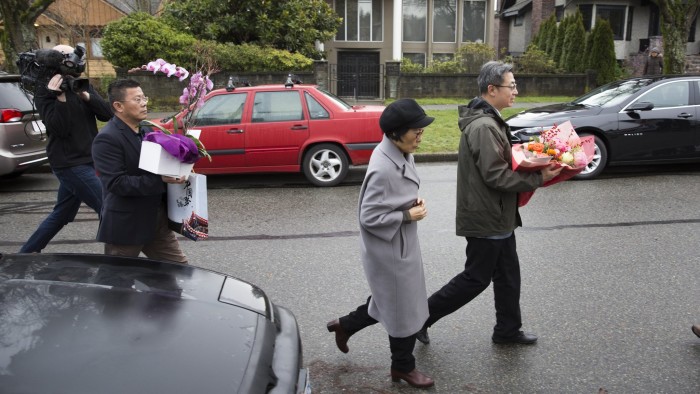
Steven Wen, who was staying with family in the neighbourhood, said he had not seen Ms Meng at all in the past month, despite walking past the residence several times a day to take his son to a school nearby.
Mr Lewis said Ms Meng rarely emerges from the house, and if she does, she is shielded by her security and quickly whisked off in cars.
Other people close to Ms Meng and her family declined to comment when contacted by the Financial Times.
Experts say her extradition is inevitable.
“Almost all extradition requests from the US to Canada are granted,” said Joanna Harrington, professor of law at the University of Alberta and a member of the Canadian Human Rights Commission.
Still, US president Donald Trump suggested as recently as last week that he might drop the Huawei charges as part of a trade deal with China, and was planning to discuss the idea with the US justice department.
Mark Wu, a professor at Harvard Law School, said: “In theory the president could direct his attorney-general to drop the investigation.”
But he added: “Normally the White House doesn’t interfere so openly at this stage and doing so might undermine the credibility of future extradition requests.”
The move has also shaken relations between China and Canada.
Just days after Ms Meng’s arrest, the Chinese government detained two Canadian nationals, Michael Kovrig and Michael Spavor, on national security charges. China’s ambassador to Ottawa Lu Shaye said in January that Canadian demands for their release represented “western egotism” and accused the country of “back-stabbing” China.
Justin Trudeau, the Canadian prime minister, also fired John McCallum, the country’s ambassador to China, in January, after Mr McCallum told local media that it would be “great” for Canada if the US dropped the extradition request.
The row has also sent ripples through companies that do business in China. Tim Stratford, chair of the American Chamber of Commerce in the region, this week said that he had received “quite a few” inquiries from members concerned about travelling to China, and warned that staff at companies involved in legal or regulatory disputes in China were at increased risk of being banned from leaving the country.
Without a political deal, the extradition process is likely to be lengthy, possibly taking years. There are hints that Ms Meng, who is living with her husband and their daughter, is already preparing for the long haul.
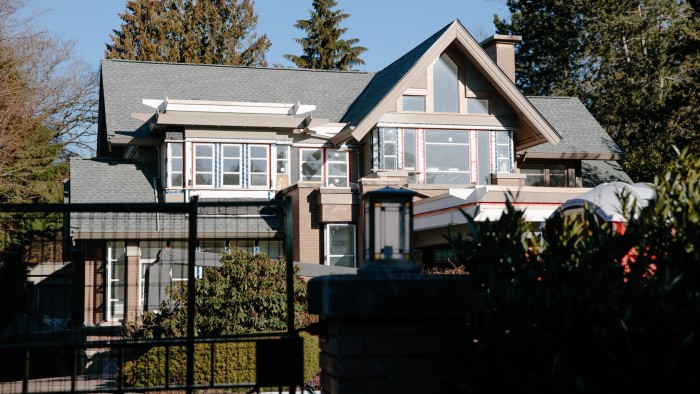
Renovations are ongoing at a second Vancouver property owned by the family: a skip and portaloo stand in the garden, while tarpaulin covers some of the windows. The second property is worth around $12m, and in a more exclusive neighbourhood just several doors down from the US consul general’s official residence.
Court documents show that Ms Meng’s husband planned to enrol their daughter in a Vancouver school during the trial, according to Reuters, and there are reports that Ms Meng plans to study for a PhD at the University of British Columbia.
In the meantime, the case has the city on edge. Some are unforgiving about her plight.
One neighbour, who did not wish to be named, said he was “cynical” about her portrayal as an innocent bystander and speculated that there were “back channels” of communication between the governments that have resulted in more favourable bail terms.
But many of the Chinese locals continue to rally behind Ms Meng.
“My friends have concerns about her,” said Grace. “She’s only the vice-president of her company so she’s not responsible: it’s the company’s responsibility.”
Additional reporting by Yuan Yang in Beijing
Canadian citizens remain in custody in China
Canadian citizens Michael Kovrig and Michael Spavor have been held in China since December 10 in a detention system known euphemistically as “residential surveillance at a designated location”.
RSDL was written into China’s Criminal Procedure Law in 2012, months before Xi Jinping rose to power and began using the measure against human rights activists and lawyers. According to Chinese law, RSDL can be used when “crimes of endangering state security, terrorist activities or especially serious bribery cases are suspected”.
Mr Kovrig, a former Canadian diplomat, was arrested in Beijing just days after news broke of Ms Meng’s arrest. He has yet to see a lawyer or his family, according to his employer, the International Crisis Group. According to one source, he is kept in solitary confinement and has been questioned three times a day. He is kept in a room with the lights turned on at night — however, he was recently reportedly given an eye mask.
Other diplomats in Beijing have protested against Mr Kovrig’s detention, saying he was questioned about his work while employed by the Canadian embassy, which is in breach of international diplomatic protocol. Chinese authorities have said the Vienna Convention principle of immunity for actions while employed as a diplomat does not apply in Mr Kovrig’s case.
Less is known about Mr Spavor’s condition, but both Mr Spavor and Mr Kovrig are allowed one visit a month from a Canadian diplomat.
Yuan Yang and Lucy Hornby in Beijing
Comments